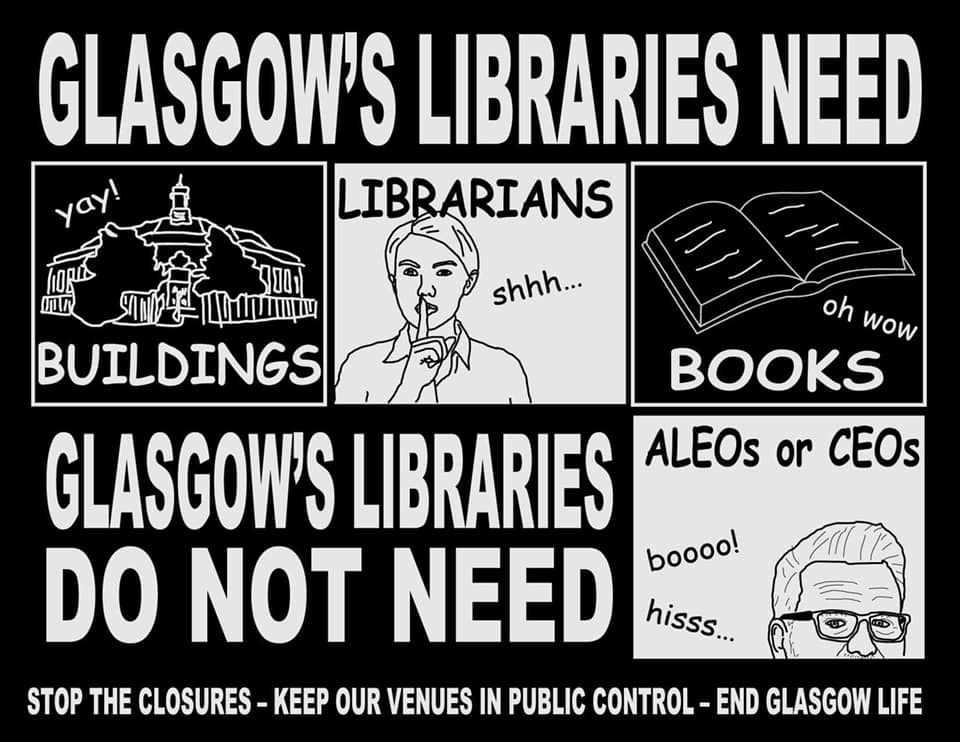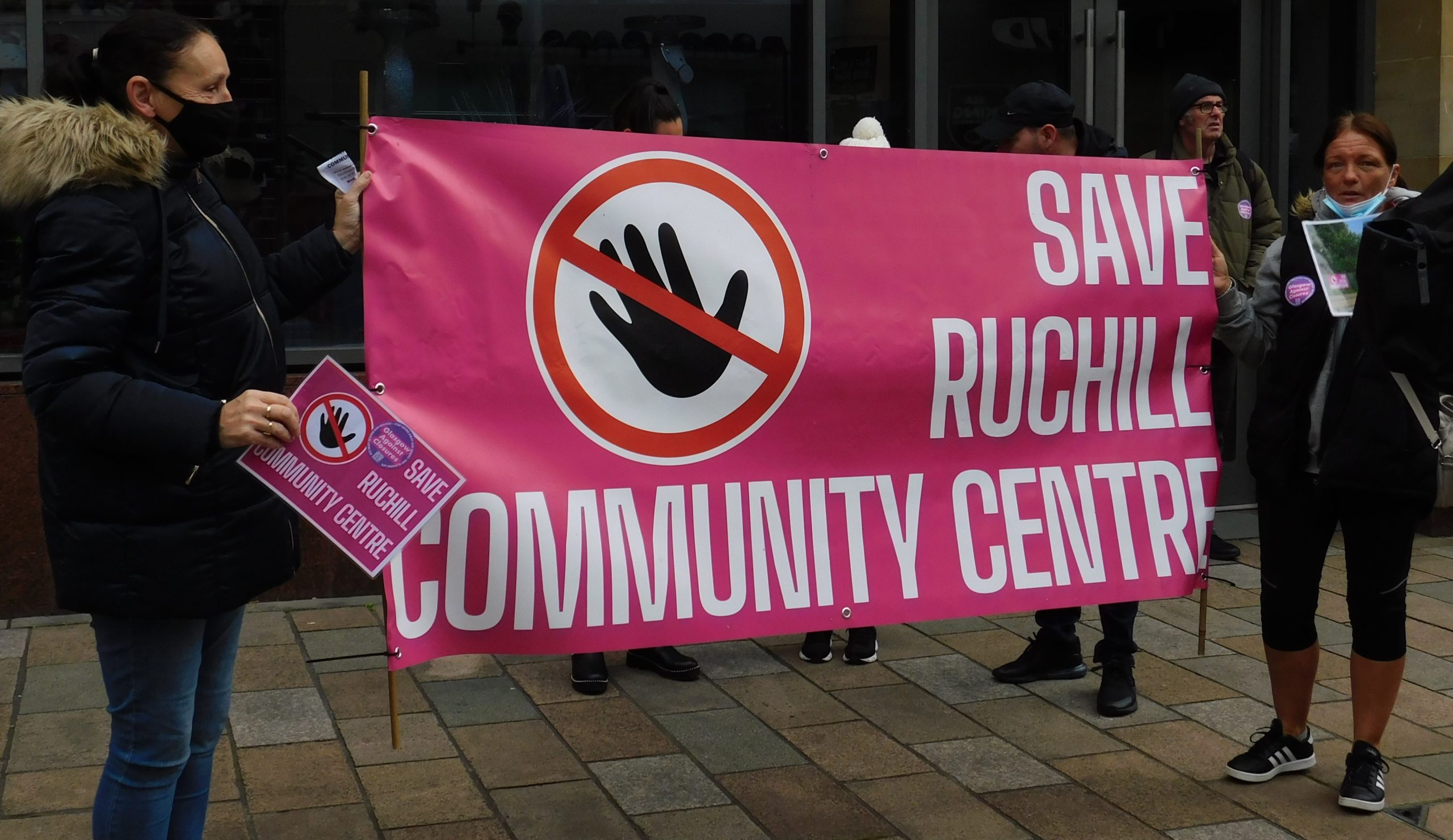Hundreds of protesters marched through the streets of Glasgow city centre on Saturday 16 October to oppose the City Council plans to close community facilities.
The SNP-led City Council has put forward a programme of expenditure cuts in the face of the growing financial crisis of Scotland’s 32 councils.
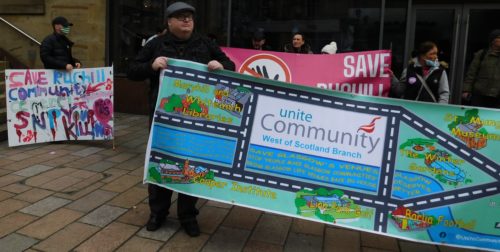
Central to the cuts programme in Glasgow is the closures of libraries, leisure and community facilities organised through “Glasgow Life“ – a semi autonomous, undemocratic offshoot of the council (officially called an Arms Length External Organisation or “ALEO”, a common feature of Scottish councils).
Council “nasty trick”
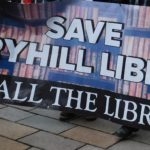 Rather than close facilities directly, the Council plans to squeeze funding forcing Glasgow Life to declare facilities are unviable and offer to hand them over instead to “community trusts” through a “Community Asset Transfer”. This means that instead of being run by the Council, using professional staff and having municipal-level economies of scale, small groups of volunteers will need to fundraise to support essential facilities like libraries and community centres. It’s a nasty trick that’s long been used by the Tories in England, aided and abetted by Labour councils like those in Birmingham and Waltham Forest. The elected politicians wash their hands of the services by handing control over which stay open or go to unelected officers, and rely on the “goodwill” and voluntary efforts of community groups to keep services going.
Rather than close facilities directly, the Council plans to squeeze funding forcing Glasgow Life to declare facilities are unviable and offer to hand them over instead to “community trusts” through a “Community Asset Transfer”. This means that instead of being run by the Council, using professional staff and having municipal-level economies of scale, small groups of volunteers will need to fundraise to support essential facilities like libraries and community centres. It’s a nasty trick that’s long been used by the Tories in England, aided and abetted by Labour councils like those in Birmingham and Waltham Forest. The elected politicians wash their hands of the services by handing control over which stay open or go to unelected officers, and rely on the “goodwill” and voluntary efforts of community groups to keep services going.
Trade unions and communities using the facilities currently under threat by the cuts by Glasgow Life have banded together to form the new “Glasgow Against Closures” protest movement.
The 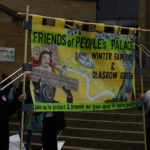 demonstration on Saturday marched from the City’s shopping area, under the watchful gaze of the statue of Labour politician Donald Dewar, to the People’s Palace in Glasgow Green to hear speakers protesting against the cuts. While there were a lot of lefty paper sellers selling their wares to each other, the important element in the protest was the engagement from local community activists like the campaigns in Drumchapel, Ruchill, Maryhill and Whiteinch parts of the City, alongside support from union members especially members of Unite the union who were prominent on the march.
demonstration on Saturday marched from the City’s shopping area, under the watchful gaze of the statue of Labour politician Donald Dewar, to the People’s Palace in Glasgow Green to hear speakers protesting against the cuts. While there were a lot of lefty paper sellers selling their wares to each other, the important element in the protest was the engagement from local community activists like the campaigns in Drumchapel, Ruchill, Maryhill and Whiteinch parts of the City, alongside support from union members especially members of Unite the union who were prominent on the march.
Municipal Financial Crisis
The municipal financial crisis has been exacerbated by the pandemic, but it has long been a problem that the Scottish devolved government is responsible for central funding of local government alongside the priorities of other directly funded central government services, the NHS in particular. As the demands on NHS Scotland grow and the ‘national’ services delivered by councils, like schools and social care, are under pressure with protected funding, the SNP Scottish government has slashed the block grant for other local services run by councils. Councils have very little source of revenue to run local services independent of their Scottish government block grant. The Council Tax is a thoroughly discredited and regressive 30 year old tax system introduced by the Tories, which both the SNP and Labour before them have criticised but failed to replace when in office. While Glasgow is the largest council and faces a particular crisis because of the cost of the equal pay settlement, all Scottish councils face the same challenges.
The SNP argue that the Scottish government, unlike the UK government for England, is forced to depend on a fixed budget with little ability to tax and raise revenue. The SNP answer to this is that rather than resist the austerity imposed on them by the Tories, we should wait for “Jam Tomorrow” in the shape of independence. The Tory UK government Spending Review on 27 October will unleash another wave of cuts in public services across the UK state with budgets in Scotland largely tied to how much is spent by the Tories in England through the ‘Barnett formula’. The reality is that Scotland is not going to achieve independence from the Tory UK government if it just means the ‘same old Tory austerity’ in new SNP clothes and a fightback to defend council services is an essential element of the battle for independence.
We urge everyone to support the union and community campaigns in their street protests and activities against the cuts today, as an essential part of the struggle for an independent and ecosocialist Scotland in future. Glasgow is the start but action needs to be built across Scotland. Five yearly ‘all-out’council elections are also due in May 2022 and there should be discussions now about a concerted united electoral challenge in local communities, to highlight the fight against the cuts and closures and build resistance across Scotland. While support from individual Labour Party members and supporters is very much welcome, we should beware the Scottish Labour Party leadership’s record of empty rhetoric against the SNP – savage cuts were also implemented during periods of Labour control of councils and the UK and Scottish governments and Labour’s support for the union saddles Scotland with Tory governments it has never voted for.
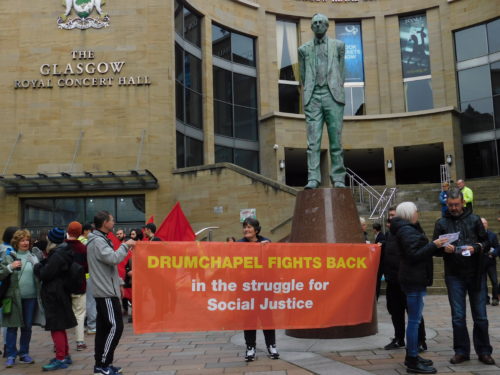
Get Involved
To get involved in Glasgow Against Closures, visit the Facebook page: https://www.facebook.com/groups/glasgowagainstclosures/ follow the campaign on Twitter, @glasgowclosures (https://twitter.com/glasgowclosures) and get involved in local groups.
(All photographs and words by Mike Picken, ecosocialist.scot)
